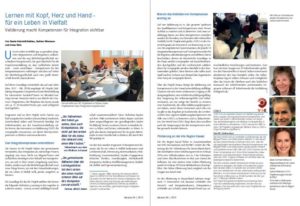 The German VIC partners DVV and BUPNET have released an article on the project in the German magazine dis.kurs – the magazine of the German Volkshochschulen (adult education centres)
The German VIC partners DVV and BUPNET have released an article on the project in the German magazine dis.kurs – the magazine of the German Volkshochschulen (adult education centres)
Please find the article on page 42 here.
Tag: competences
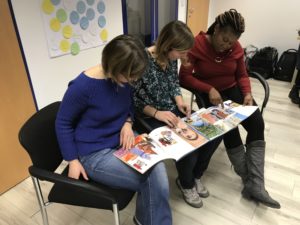 The fourth newsletter gives an overview of the piloting phase and summarises the main outcomes and results. All partners carried out national pilots and reported on their achievements, successes, challenges and lessons learnt. The report on the piloting phase will soon be made available on this website.
The fourth newsletter gives an overview of the piloting phase and summarises the main outcomes and results. All partners carried out national pilots and reported on their achievements, successes, challenges and lessons learnt. The report on the piloting phase will soon be made available on this website.
 The VIC team invites you to its final conference in Thessaloniki on 16th of October, 2019.
The VIC team invites you to its final conference in Thessaloniki on 16th of October, 2019.
Please find the conference agenda here.
The conference venue is: Aristotle University Research Dissemination Centre (KEDEA), 3is Septemvriou, Thessaloniki 546 36, Greece
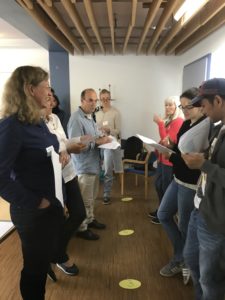 On 07.09.2019 we had the opportunity to provide a 2-hour workshop entitled “Assessing and enhancing integration competences of refugees” in the framework of the Language Day (German as a foreign language) organised by the Hessische Volkshochschulverband. The workshop involved teachers and counsellors that provide integration and languages courses for refugees.
On 07.09.2019 we had the opportunity to provide a 2-hour workshop entitled “Assessing and enhancing integration competences of refugees” in the framework of the Language Day (German as a foreign language) organised by the Hessische Volkshochschulverband. The workshop involved teachers and counsellors that provide integration and languages courses for refugees.
 The VIC consortium is waiting for you in Thessaloniki on 16th of October, 2019.
The VIC consortium is waiting for you in Thessaloniki on 16th of October, 2019.
The VIC consortium invites you to the final conference of the VIC project. The conference will be hosted by our Greek partner Aristotle University on 16th of October, 2019 at 10.00 AM.
Apart from presenting the main outcomes and lessons learnt in terms of implementing the VIC approach on enhancing and validating integration competences, we will give space and time for discussions, exchanges, workshops, and networking, so that all participants can be part of the conference processes.
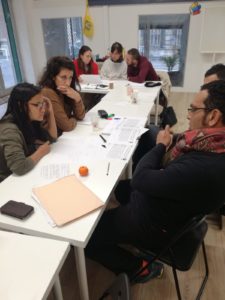 On February 4th, 2019, the opening workshop took place in Kassel. It was attended by nine adult eductors who work in different settings with refugees – coaching, language courses, vocational training.
On February 4th, 2019, the opening workshop took place in Kassel. It was attended by nine adult eductors who work in different settings with refugees – coaching, language courses, vocational training.
The participants showed a great deal of interest in the project itself and were particulary interested in the general activities of the other VIC partners. Moreover, they were curious to learn more about the new opportunities provided by VIC: the e-learning platform – for some of them the first time they would do e-learning – and the validation of competences – a new concept for all of them.
In addition to this workshop, other workshops took place in Bonn carried out with trainers of DVV, and in Göttingen carried out with trainers of BUPNET.
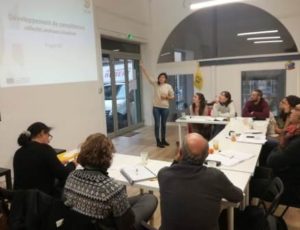 The pilot phase was launched in Greece, France and Italy with national workshops, wheras in Germany and Austria, the opening workshops will be held in January 2019.
The pilot phase was launched in Greece, France and Italy with national workshops, wheras in Germany and Austria, the opening workshops will be held in January 2019.
Each VIC partner will involve ten or more adult educators that will take part in the national workshops and in the subsequent e-learning phase. They will then implement their newly acquired knowledge in national learning projects that will involve refugees and migrants. The purpose of the piloting phase is to verifiy whether the VIC approach and blended learning course actually support the adult educators to plan, deliver and evaluate innovative integration learning activities and eventually to validate the integration competences developed in these learning offers.
The piloting phase will be documented by means of national reports that each partner will set up on the basis of the feedback gathered from the involved participants.
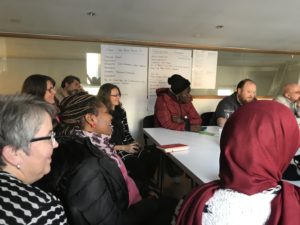 The third newsletter presents the blended learning programme consisting of national workshops in each partner country, e-learning modules, and the piloting phase. The e-learning course aims to introduce our concept and to support adult educators to plan, deliver and evaluate innovative integration learning activities and eventually to validate the integration competences developed in these learning offers. Please download the newsletter here.
The third newsletter presents the blended learning programme consisting of national workshops in each partner country, e-learning modules, and the piloting phase. The e-learning course aims to introduce our concept and to support adult educators to plan, deliver and evaluate innovative integration learning activities and eventually to validate the integration competences developed in these learning offers. Please download the newsletter here.
 The VIC blended learning course is now available. It consists of: national workshops in each partner country, e-learning modules, and piloting phase. The e-learning course aims to introduce our concept and to support adult educators to plan, deliver and evaluate innovative integration learning activities and eventually to validate the integration competences developed in these learning offers.
The VIC blended learning course is now available. It consists of: national workshops in each partner country, e-learning modules, and piloting phase. The e-learning course aims to introduce our concept and to support adult educators to plan, deliver and evaluate innovative integration learning activities and eventually to validate the integration competences developed in these learning offers.
The four learning modules provide a combination of theoretical input, learning activities and a variety of examples and practical tips on how to implement the VIC-approach in the daily work with your learners.
If you are interested to take part in the blended learning course, please don’t hesitate to contact one of the partner institutions
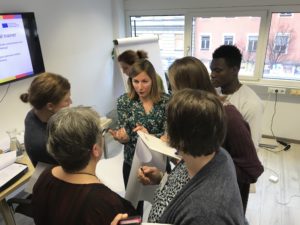 The German partners, DVV and BUPNET, were invited to provide a workshop in the framework of the conference entitled Angekommen in Deutschland – was nun? (please find the documentation in German here) organised by the German NA.
The German partners, DVV and BUPNET, were invited to provide a workshop in the framework of the conference entitled Angekommen in Deutschland – was nun? (please find the documentation in German here) organised by the German NA.
After a short introduction into the project, Sabine and Beater presented the concept of “integration” and the different competencies associated with it. The aim is to evaluate and visualise these competences using the LEVEL5 validation system. This has already been developed in various previous projects. The participants were given an overview of the LEVEL5 reference system and its application in the VIC project. Then all participants were given the task to firstly assess themselves in terms of their knowledge, skills and attitudes using the reference system for the competence “Intercultural Communication”. This self-assessment was then jointly evaluated and discussed – with the participants finally agreeing that a well-founded self-assessment is indeed difficult, but at the same time helpful and valuable.

